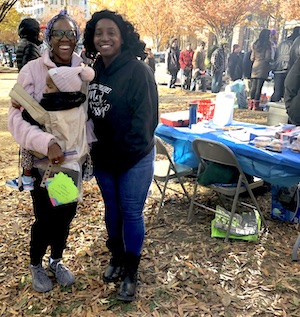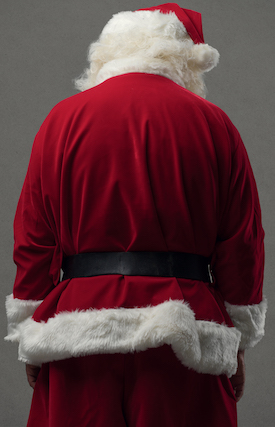Identity theft is illegal, but Santa Claus is co-opting Jesus with impunity.

Across the world people are planning to celebrate Dec. 25 or Christmas Day, as the son of God’s birthday, but they will actually be doing the opposite.
“… Jesus was not born in December. God in the Person of Master Fard Muhammad, to Whom Praises are due forever, has taught me that his birthday took place between the first and second weeks of September, and that no one knows exactly what day he was born, for it was a secret kept between Joseph and Mary to save them both from being murdered by getting a baby out of wedlock,” stated the Honorable Elijah Muhammad in his 1974 book, “Our Saviour Has Arrived.” He offers a deeper understanding of his teacher, the Great Mahdi Master Fard Muhammad, and insight into prophecies and world events.
“The real truth that the Christians hate to confess is that Joseph had gotten the child, Jesus, by Mary while he was married to another woman and at that time had six children by the first marriage. So Master Fard Muhammad (God in Person) has taught me,” revealed the Honorable Elijah Muhammad.
The 25th of December is the birthday of Nimrod, the evil demon of the White race, who was born in the last 300 years of the civilization of Moses, around the 17th century B.C., he wrote.
“Nimrod was one of the most wicked men who ever lived. Nimrod is the man that destroyed the Law of Moses: He broke the civilization of Moses 17 centuries after Moses, and three centuries before Jesus was born into the world,” said the Honorable Minister Louis Farrakhan, further explaining what his teacher revealed from God.
“What is meant by ‘he broke the civilization of Moses’ is that Nimrod made the Law of Moses of non-effect. And when you make the law that Moses established of non-effect, you have busted up the civilization of Moses. Nimrod was a man that had a strange [incestuous] relationship with his mother, Semiramis; and when she died, they say an ‘evergreen tree rose up out from her grave,’ and they would put gifts under the tree. So here you are practicing what the heathens practiced who worshipped Nimrod and his mother. Both of them rebelled against God,” stated Min. Farrakhan.
Co-opted, corrupted and commercialized
Christmas is branded with slogans of good cheer, prosperity, merriment, and joy to the world, but the whole season is permeated with stress, greed, commercialization and consumption.
Every holiday season, hundreds of lives are lost due to drunk drivers. Nationally, over the past five years, an average of 300 people died in drunk driving crashes the week between Christmas and New Year, according to the U.S. Department of Transportation. Alcohol-impaired fatalities make up more than a quarter of all crash fatalities. In 2016, 781 people lost their lives in drunk driving-related crashes in the month of December alone, according to statistics.
Participation in Christmas to some degree is waning, observed Student Minister Demetric Muhammad of Muhammad Mosque No. 55 and member of the Nation of Islam Research Group.
As consumption and consumerism have become predominant throughout American society, many people aren’t found shying away from purchasing or receiving gifts. “But you have very little of the association of the buying and the receiving of gifts with the religious reasons and the religious traditions that circulate around Jesus as it once was, and that could be both good and bad,” said Demetric Muhammad.
Holiday retail sales are likely to increase between 4.5 and 5 percent in 2019, compared to 2018, according to Deloitte’s annual holiday retail forecast. It forecast overall holiday sales will exceed $1.1 trillion between November to January, not to mention e-commerce sales, projected to reach between $144 billion to $149 billion this season, according to the accounting giant’s Sept. 17 press release.
Drunken stupor
During chattel slavery, according to the great abolitionist Frederick Douglass, plantation masters who feared their slaves would either escape or revolt, gave them plenty of alcohol to drink during Christmas. And this drunken stupor or state of near-unconsciousness dampened the revolutionary spirit of the slaves.

“In other words, they wanted us to be too drunk, too out of our right mind, to think about the wretchedness of our condition, that really in truth, we didn’t have much to celebrate,” commented Demetric Muhammad. “We didn’t have much to be happy about. We were slaves, and Jesus was born to liberate all mankind, then should not we during his birthday celebration as an appropriate response to the birth of a liberator, should not we seek to liberate ourselves?”
“There is no doubt that too many Africans, unaware of the history of Christmas, will spend too much money that we do not have to splurge during this harmful holiday. However, it is also clear that more and more Africans and other oppressed peoples are escaping the ideological grasp that our oppressors have over us with the use of institutions like Christmas,” Omali Yeshitela, chairman of the African People’s Socialist Party, told The Final Call in a statement in an email.
He said one of the more egregious or shocking implications of Christmas is that it teaches that there is a fat White man located in a part of the world where labor is often impossible because of the climatic conditions. Yet somehow this obese Caucasian brings goodies that are the product of labor.
“The tale is that these goodies, brought to those who are ‘good,’ are created by mythological creatures called elves. This is a myth that helps to obscure the origin of the wealth in the possession of the White world, the ‘good.’ We know that the wealth was actually created by people, by the enslaved and colonized, especially Africans whose enslavement was part of the productive process that gave birth to the system of capitalism and the rise of White power,” stated Chairman Yeshitela.
Christmas helps to consolidate a White national consciousness upon much of the world and undermines a Black national consciousness necessary for Black liberation, he added.
“It keeps us locked into a belief system that serves our oppressors and supports our servitude. It is a holiday that facilitates the voluntary surrender of our hard-earned resources to our historical exploiters and national oppressors. It is a holiday that serves to keep us loyal to a system that impoverishes and kills our people with impunity,” he said.
“And, of course, it continues to be true that it is a holiday that makes it necessary for us to ignore the heroic struggles of our impoverished parents and elderly to provide for our children,” he continued. “The mythological jolly fat White man, the stand in for White power, is offered up as the real provider for our people whose enslavement created all the wealth that is responsible for White men being fat and jolly.”
The problem of paganism
The problem with the celebration known as Christmas is it’s all about White idolatry or worshipping White images that Blacks cannot see their own Black divinity, according to Dr. Ashra Kwesi, historian and lecturer on ancient African history and religion.
“When we look at this time of the year, that we have to go all the way back to ancient Kemet, referred to as Egypt by the Greeks, and this is where many of the stories were plagiarized from–the holy birth and the origin of the story of the Black Madonna–all is coming up out of African people’s consciousness,” he said.
“That first story of the Black Madonna would be that of a statue the Greeks refer to as Isis and the holy child being Heru and the Holy father being Asar,” according to Dr. Kwesi, who referred to research by the late great Dr. Ishakamusa Barashango, author of “Afrikan People and European Holidays: A Mental Genocide.”

Dr. Barashango chronicled how Christmas and other European holidays were copied from the ancient spiritual system of Black divinity.
Black families seeking spiritual alternatives turn to the Pan African holiday Kwanzaa, created by Dr. Maulana Karenga, professor and chair of the Department of Africana Studies at California State University-Long Beach.
Kwanzaa is based on the Nguzo Saba (The Seven Principles): Umoja (Unity), Kujichagulia (Self-Determination), Ujima (Collective Work and Responsibility), Ujamaa (Cooperative Economics), Nia (Purpose), Kuumba (Creativity), and Imani (Faith). It is observed Dec. 31-Jan. 1, and was first celebrated in 1966.
Revolution of kindness
“It doesn’t cost money to be kind … this Christmas, let love break out in the ghetto,” said Min. Farrakhan, when he issued a two-fold call in 2015 for people to stop the madness and make Christmas a real mass for Christ.
People like Majidah Muhammad, a young Muslim teacher in Washington, D.C. responded and launched the Spread Love Crew, an effort to feed the spirit. The wife and mother of two, along with her husband, Khabir, their two children, mother, Final Call Staff writer Nisa Muhammad, and brother Nasser, began a crusade to give at least 2,000 hugs and kind notes to strangers by January 2020.
“I gave some to my brother (Nasser Muhammad). He works at a school and he gave them to all the teachers. I have put them on people’s car window shields. I went to feed the hungry in an area where there are some people who don’t have homes, and they’re living outside, and so I gave the notes to them. We’ve been in the mall. We’d hand out the notes. I was in the hospital before visiting one of my friends, I gave them to a nurse, and so really it’s just to put a smile on people’s face and just a way for me to create the world in which I want to see, where people feel valuable, worthy and loved.”
“I would love to live in a world where everyone feels valuable as well as feel loved and I know that I play a part in creating that world that I want to live in,” she said.
“And it really doesn’t take much at all to write a note, literally. We all have paper and pen to write a note to give to somebody that you don’t even know, to just bring joy to them, to show love to them, and it does take vulnerability, of course, to do this, but, we all can do it and the impact is major.”
Part of her effort stems from a mandate by her participation in a leadership group inspiring her to do good, and in part by Min. Farrakhan’s example.
“Specifically with community, of course, I thought about the Minister and how he is constantly spreading love to our community, and I thought about the Minister galvanizing the brothers to go out into the communities with The Final Call,” she said. “And when I had the notes in mind, I imagined going with my husband, my husband with The Final Call and me with the notes to give to people and being able also to give them The Final Call, give them the notes, and invite them out to the mosque,” she stated.
“The picture that is constantly in my head is just the Minister with the people in our community, whether that’s him hugging them, him talking to them, him shaking their hands, and so I am now myself and my family doing the exact same thing.”
“People are already joining. Even when I was passing notes to those who were feeding, other people asked, ‘Oh, can I have some of the notes to hand out?’ ”
She added, “As I write them, I’m like, I need this! This is giving me joy and life and inspiration!”












